Heather Hansen
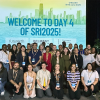 At the recent Sustainability Research and Innovation Congress (SRI2025), held for the first time in the U.S., CU Boulder made a powerful showing—solidifying its role as a global voice in sustainability research, education and skills training.
At the recent Sustainability Research and Innovation Congress (SRI2025), held for the first time in the U.S., CU Boulder made a powerful showing—solidifying its role as a global voice in sustainability research, education and skills training. As the Grand Challenge wrapped up this year, key contributors reflected on nearly a decade of ambitious, trailblazing programs spanning CU Boulder and beyond that continue to make new discoveries, spin off new entities and address important national and global challenges.
As the Grand Challenge wrapped up this year, key contributors reflected on nearly a decade of ambitious, trailblazing programs spanning CU Boulder and beyond that continue to make new discoveries, spin off new entities and address important national and global challenges. Rachael Seidler, professor of applied physiology and kinesiology at the University of Florida, will deliver this year’s Rose M. Litman Memorial Lecture in Science on April 4 at CU Boulder: “Brain and Behavioral Changes with Human Spaceflight: Dysfunction and Adaptive Plasticity.”
Rachael Seidler, professor of applied physiology and kinesiology at the University of Florida, will deliver this year’s Rose M. Litman Memorial Lecture in Science on April 4 at CU Boulder: “Brain and Behavioral Changes with Human Spaceflight: Dysfunction and Adaptive Plasticity.”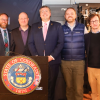 Governor Jared Polis unveiled plans to invest in Colorado’s quantum ecosystem via a new refundable tax credit program that aims to maximize the state’s competitiveness as a tech hub—including CU Boulder, already a global leader in quantum research and innovation.
Governor Jared Polis unveiled plans to invest in Colorado’s quantum ecosystem via a new refundable tax credit program that aims to maximize the state’s competitiveness as a tech hub—including CU Boulder, already a global leader in quantum research and innovation. The gathering, which took place on December 7, brought together enthusiastic CU Boulder faculty Fulbright awardees, who visited locations worldwide, to share their stories. Some attendees showed slides of their unique time abroad and talked about the huge and transformative impact their experiences have had on them, personally and professionally.
The gathering, which took place on December 7, brought together enthusiastic CU Boulder faculty Fulbright awardees, who visited locations worldwide, to share their stories. Some attendees showed slides of their unique time abroad and talked about the huge and transformative impact their experiences have had on them, personally and professionally.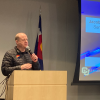 A broad coalition of stakeholders gathered at CU Boulder on January 25 at a first-of-its-kind Colorado Semiconductor Workforce and Innovation Forum, hosted in partnership with OEDIT, to celebrate the state and university’s key roles in sustaining a vibrant semiconductor ecosystem and to discuss how to shape its future.
A broad coalition of stakeholders gathered at CU Boulder on January 25 at a first-of-its-kind Colorado Semiconductor Workforce and Innovation Forum, hosted in partnership with OEDIT, to celebrate the state and university’s key roles in sustaining a vibrant semiconductor ecosystem and to discuss how to shape its future.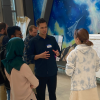 CU Boulder’s second annual Sandia Day drew over 160 registered attendees for a packed agenda highlighting the strong partnership between the university and Sandia National Laboratories, potential future avenues for collaborative, globally impactful research, and job and internship opportunities.
CU Boulder’s second annual Sandia Day drew over 160 registered attendees for a packed agenda highlighting the strong partnership between the university and Sandia National Laboratories, potential future avenues for collaborative, globally impactful research, and job and internship opportunities. CU Boulder is a partner of the CO-WY Engine, one of 16 finalists for NSF's inaugural Regional Innovation Engines competition, which could net winners $160M over 10 years. NSF Engines funds regional hubs that will increase the speed and scale of emerging, critical and use-inspired technology.
CU Boulder is a partner of the CO-WY Engine, one of 16 finalists for NSF's inaugural Regional Innovation Engines competition, which could net winners $160M over 10 years. NSF Engines funds regional hubs that will increase the speed and scale of emerging, critical and use-inspired technology.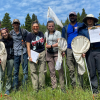 CU Boulder’s Mountain Research Station has a three-pronged mission: host some of the most influential and long-running ecological research in the world, give students a peerless education in mountain environments, and link the public to learning about important ecosystems.
CU Boulder’s Mountain Research Station has a three-pronged mission: host some of the most influential and long-running ecological research in the world, give students a peerless education in mountain environments, and link the public to learning about important ecosystems. Three CU Boulder faculty will lead projects awarded through the Department of Defense (DoD) competitive Multidisciplinary University Research Initiative (MURI) Program. CU Boulder was matched only by MIT in receiving three MURI awards. Each team will receive an average award of $7.1M over the next five years.
Three CU Boulder faculty will lead projects awarded through the Department of Defense (DoD) competitive Multidisciplinary University Research Initiative (MURI) Program. CU Boulder was matched only by MIT in receiving three MURI awards. Each team will receive an average award of $7.1M over the next five years.

